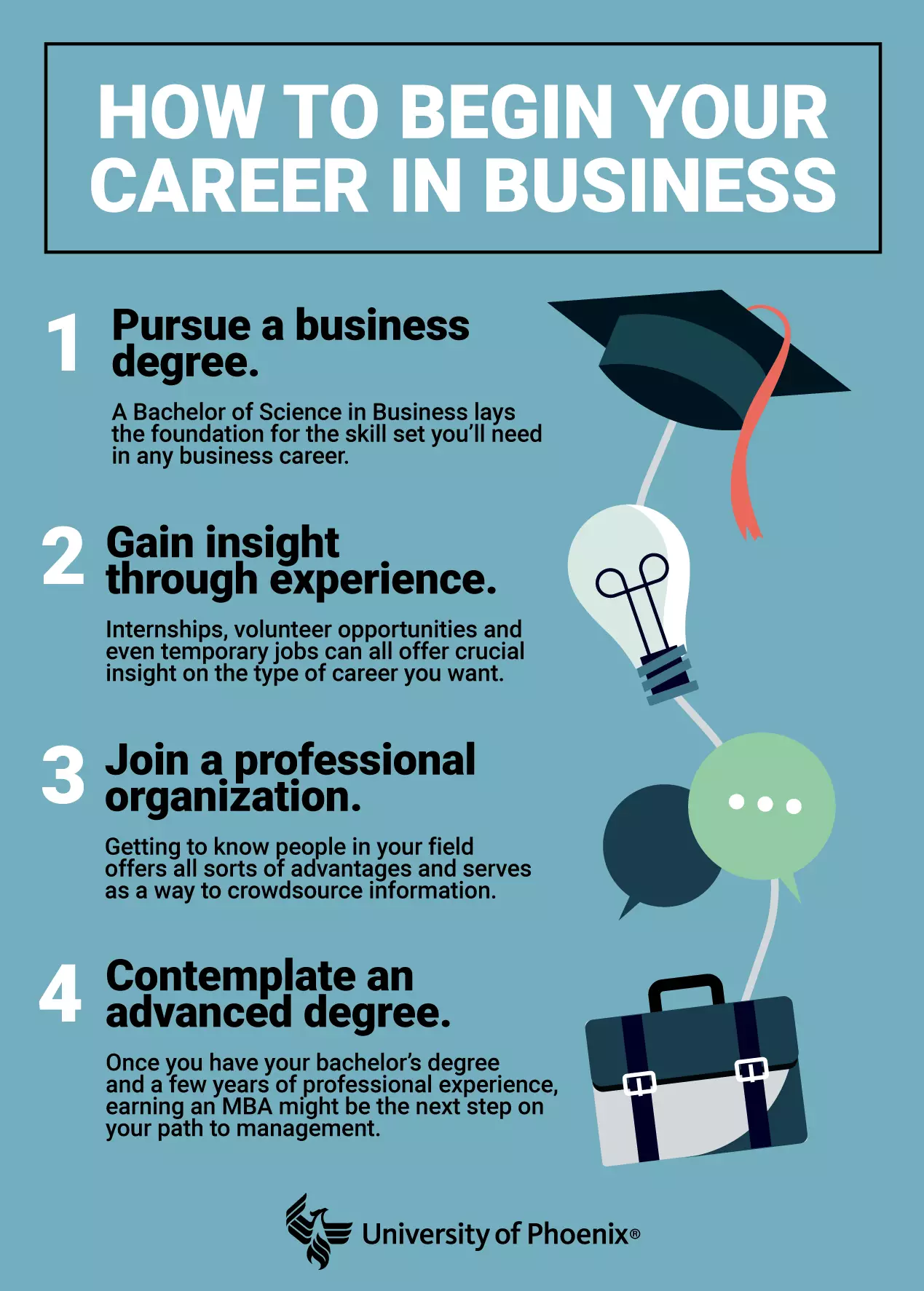MBA careers: What to do with an MBA

Written by Elizabeth Exline

Reviewed by Kathryn Uhles, MIS, MSP, Dean, College of Business and IT

In this article
What is an MBA?
A Master of Business Administration , or MBA, is a graduate degree that delves into the subject of business management and administration. Courses tend to focus on critical thinking and effective management. This program aims to prepare graduates to lead organizations of any size into the future.
Pursuing a Master of Business Administration (MBA) degree
When it comes to education, there's no one-size-fits-all approach. But the degree track that possibly comes the closest is the MBA. Covering such skills as management, decision-making and leadership, an MBA prepares for a variety of career paths, including roles in business operations management and administration.
The MBA’s versatility may also account for its popularity among students. While recent reports suggest a decline in overall applicants for MBA programs, it has historically outperformed most master’s programs. In the 2021-22 academic year, more MBAs were conferred (202,334) than any other master’s degree, according to the National Center for Education Statistics . (Only the health professions and related programs came close with 142,025 master’s degrees conferred.)
Like the utility of an MBA, which is diverse and evolving, earning an MBA is a process with many opportunities for customization. As you consider furthering your education, ask yourself the following questions:
- Do you want to attend a full-time or a part-time program?
- Do you want to explore a competency-based Master of Business Administration program
for an expedited experience?
- Do you want to customize your MBA with a certificate in accounting or human resources?
Depending on your answers, an online MBA from University of Phoenix could offer the right level of flexibility and skills that can enhance your career.
Let’s explore what’s possible when it comes to getting an MBA and putting it to work for you after graduation.
Is an MBA worth it?
Deciding whether to pursue an MBA depends on your goals. Not only can it teach you new skills but you also may be able to benefit from networking opportunities.
"An MBA can be helpful in distinguishing you in your field and demonstrates your commitment to learning," says Kathryn Uhles, MIS, MSP, dean of the College of Business and Information Technology at University of Phoenix. "It can’t guarantee you professional success, but it can lay a strong foundation for you to pursue the career path you want."
Ultimately, if you’re looking to enhance your career in business with a leadership role, or if you’re planning to start your own company someday, an MBA might be a smart move.
3 paths for MBA careers
An MBA doesn’t limit you to one industry or role. In fact, many professionals use an MBA to potentially enhance their career. At University of Phoenix, the MBA programs available can help prepare you for the following professions:
1. Business manager
- Overview: Business managers plan and oversee measures that help their organizations achieve optimal efficiencies. Areas that may fall under their jurisdiction include budgets, marketing, business strategy and personnel.
- National median salary: As of May 2023, according to the U.S. Bureau of Labor Statistics (BLS), business managers earned between $62,470 and $188,820 annually, with a median salary of $106,470.
- Education requirements: A bachelor’s degree and related work experience are customary. Specific employers may require an MBA.
- Job outlook: The projection is for growth of 5% between 2022 and 2032, according to BLS.
Salary ranges are not specific to students or graduates of University of Phoenix. Actual outcomes vary based on multiple factors, including prior work experience, geographic location and other factors specific to the individual. University of Phoenix does not guarantee employment, salary level or career advancement. BLS data is geographically based. Information for a specific state/city can be researched on the BLS website.
BLS Occupational Employment Projections, 2022-2032 is published by the U.S. Bureau of Labor Statistics. This data reflects BLS’ projections of national (not local) conditions. These data points are not specific to University of Phoenix students or graduates.
2. General and operations manager (GM)
- Overview: General managers are often responsible for multiple departments and may be required to formulate policies and manage daily operations. Like GMs, operations directors have a diverse set of skills and job duties that are difficult to classify, although these tasks may occur at an organizational rather than store or location level. They may help draft company policy, direct operations and plan HR strategies.
- National salary range: The range was $46,340 to $232,110 annually as of May 2023, according to BLS
. The median was $101,280.
- Education requirements: Most management roles require a bachelor’s degree at minimum. Specific employers may require an MBA.
- Job outlook: A projected 4% increase is forecast
between 2022 and 2032, or roughly 147,300 jobs, according to BLS.
3. Administrative director
- Overview: Administrative directors
oversee and coordinate a company’s daily operations. Their responsibilities include developing administrative practices, including records management, and training protocols. In some smaller organizations, an administrative director might handle the duties of a chief executive officer or chief operations officer.
- National salary range: The annual range was $62,470 and $188,820, with a median salary of $106,470 in May 2023, according to BLS
.
- Education requirements: Most administrative director roles require a bachelor’s degree at minimum, although some companies might prefer a master’s degree or higher.
- Job outlook: BLS projects this occupation to grow 5%
between 2022-2032.
How to get an MBA
To get an MBA, students need a bachelor’s degree first. Then one must apply to their program of choice. How many units or credits it takes to complete an MBA may depend on whether applicable credits were transferred or not.
Finding the right MBA program means evaluating both your situation and your goals. At University of Phoenix, the Master of Business Administration was developed to align with the market’s in-demand skills. For example, skills taught in UOPX courses include overall business administration, international economics, economic theories, capital budgeting, cost benefit analysis and much more.
Independent learners with professional experience and a penchant for a self-led format may also consider the competency-based MBA program. This program is designed for experienced professionals who can demonstrate proficiency in business leadership. In the CB program students take courses such as data analysis and business analytics, corporate finance, the digital economy and more.
How long does it take to get an MBA?
The MBA program length at University of Phoenix is approximately 16 months, with students taking just one course at a time. The program requires 33 credits but could possibly be less depending on whether an individual student transfers credits.
The competency-based program can be finished even sooner, in just one year. Start dates for both programs are available throughout the year.
MBA requirements
Once upon a time, aspiring MBA students couldn’t contemplate graduate school without taking either the Graduate Management Admission Test (GMAT) or the Graduate Record Examination (GRE). The happy ending to that story is that such standardized exams are no longer universally required.
University of Phoenix does not require GMAT or GRE scores for acceptance. Chris Gloor, the vice president of enrollment at University of Phoenix, explains this policy: "We are a university designed for working adults. Requiring exam results simply adds one more barrier to helping them achieve their goals. We’re in the business of removing barriers, not adding them."
How to prepare for an MBA program
You’ll need more than a strong internet connection to successfully complete an MBA program. According to Uhles, here’s how to prepare for your courses:
- Establish good time management skills.
- Manage your own expectations — you’ll have papers, tests and deadlines to meet on top of your current obligations. Plan accordingly.
- Get your financials in order
, from completing the FAFSA® on time to applying for any scholarships ahead of time. The fewer financial surprises you encounter along your journey, the better.
The cost of an MBA
At University of Phoenix, the MBA program tuition is both affordable and competitive. Even better, your tuition rate gets locked in when you start so that you pay the same amount for the last credit that you did for the first. Curious how UOPX stacks up against other schools? We’re happy to show you
.
The cost of time and money may be significant. But the return may be even more so.
Paying for school
Tuition is based on number of credit hours per course. Courses are typically 3 credits, but can range from 1-6 credits. Costs do not include savings opportunities like transfer credits and scholarships.
Master's cost per course
$2,289 / course

What affects the overall cost of my program?
Your full program cost can vary by:
- Savings opportunities. Get your degree faster and for less with eligible transfer credits, scholarships and work experience credits. Students with eligible credits and relevant experience can save up to $6,800 and 9 credits off their master’s degree.
With our Tuition Guarantee, you pay one flat, affordable rate from the moment you enroll to the day you graduate from your program.
Earn your master’s degree faster and for less with eligible savings opportunities:
University of Phoenix MBA degree vs other universities
| Phoenix | |
|---|---|
|
Tuition rate
|
$698
|
|
Typical credits per course
|
3
|
|
Resource fee
|
$195
|
|
Estimated cost per course
|
$2,289
|
|
Total program length
|
33 cr.
|
|
Length of course
|
6 wks
|
|
Tuition Guarantee Promise
|
Yes
|
Data pulled on March 24, 2025
[1]Source of data: For each institution, the data are publicly available in multiple locations, including Academic Catalogs, Program pages, Tuition and fees pages, and syllabi. All data are publicly available on the websites.
Certain licensure programs and coursework in other degree programs may have additional fees. Please check with your advisor or course catalog for additional info.
Tuition is based on number of credit hours per course. Courses are typically 3 credits, but can range from 1-6 credits.
Earn a degree in business at University of Phoenix
If you’re looking to take the first step toward expanding your business knowledge and skill set, University of Phoenix offers a variety of degree options. These include:
- Bachelor of Science in Business
: This program educates students on core business concepts that can prepare them for management roles. Skills taught include training and development, organizational culture, operations management and more.
- Bachelor of Science in Management
: This program builds leadership skills to help individuals become stronger managers and executives within organizations. It teaches skills such as business law and ethics, risk management, standard operating procedures and more.
- Bachelor of Science in Communication
: This program equips students with speech and writing skills that can make individuals valuable assets to any organization. Skills taught include organizational skills, content development, written communication and persuasive communication.
- Master of Business Administration
: In addition to business administration, students in this program get an in-depth education on such principles as management, the digital economy, legal aspects of business and more.

ABOUT THE AUTHOR
Elizabeth Exline has been telling stories ever since she won a writing contest in third grade. She's covered design and architecture, travel, lifestyle content and a host of other topics for national, regional, local and brand publications. Additionally, she's worked in content development for Marriott International and manuscript development for a variety of authors.

ABOUT THE REVIEWER
Currently Dean of the College of Business and Information Technology, Kathryn Uhles has served University of Phoenix in a variety of roles since 2006. Prior to joining University of Phoenix, Kathryn taught fifth grade to underprivileged youth in Phoenix.
This article has been vetted by University of Phoenix's editorial advisory committee.
Read more about our editorial process.
Read more articles like this:




